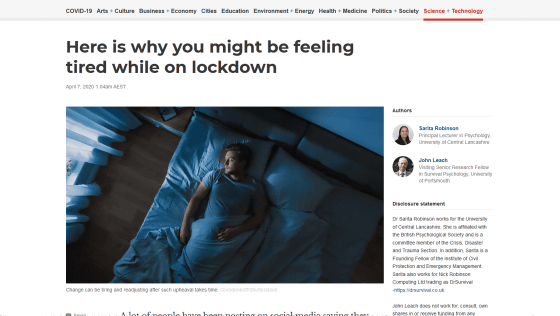Why do you feel more tired than usual during the blockade measures that keep you out?

In order to control the epidemic of the new coronavirus infectious disease (COVID-19), each country has adopted a strategy of keeping social distance, and in some countries, mandatory urban blockades are being implemented. Since you cannot walk freely during the city blockade, the amount of exercise will be less than usual, but on SNS it is reported that many people are reporting “blocking fatigue”, so that
Here is why you might be feeling tired while on lockdown
https://theconversation.com/here-is-why-you-might-be-feeling-tired-while-on-lockdown-135502

Under restricted access, people are less likely to move than they normally are. Despite this, researchers point out that the feeling of fatigue that people feel isn't caused by physical reasons, but by mental reasons. A 2011
For example, those who have changed their environment, such as those who have graduated from school and have a job, or those who have moved to a foreign country, need time to adapt to the new environment. First of all, to adapt to a new environment, people must move away from their old ways of living and working and establish interactions in the new environment. After this stage, people's lives become somewhat predictable.
In the subsequent stages, people will slowly become accustomed to the new environment, and it will take about three months after the environment changes to adapt to the new lifestyle. During this time, the person may suddenly feel sick and start crying, or lose motivation to adjust to a new environment, but actions such as writing out one's feelings in sentences help the adjustment, the researchers say. I will. The COVID-19 pandemic has also changed the lives of many people, which can make them feel depressed until they adapt to their new life.

Also, people who have undergone major environmental changes are likely to face indifference and motivation toward their surroundings. If you don't have a way of spending your day in a new environment, you'll have more time to spend nothing in your life, and you will feel that your life is limited and you will be withdrawn. They tend to become indifferent to the surrounding events.
Under such a pandemic situation, researchers recommend that 'strictly decide your daily life schedule and spend according to it.' For example, in 1898 the Belgian Antarctic expedition
So, in 1915, Ernest Shackleton, who led the British Antarctic expedition, imposes rigorous routines on the crew when the expedition ship Endurance decides to overwinter in the Antarctic ice. did. Shackleton set a strict meal time and forced a large group of people to gather after dinner for socializing. By letting the crew live according to their planned behavior, it seems to have prevented the morale from degrading due to the long-term confinement of a small group.

by
Many people say that working from home makes it possible for them to sleep later than usual, and that their daily rhythms have become self-degrading. But researchers argue that creating a clear daily routine and having more time to interact with someone online reduces fatigue. Also, exercises such as going out for a walk or doing exercises at home so that they do not come into intimate contact with people can improve the quality of sleep and eventually help eliminate chronic fatigue.

Related Posts:
in Note, Posted by log1h_ik







